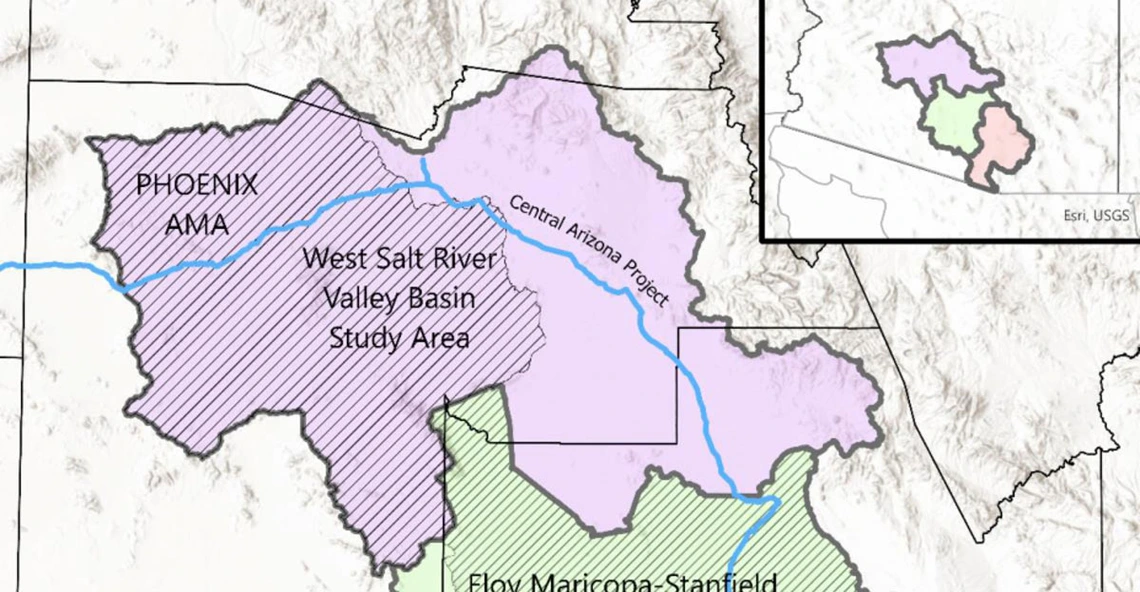BOR Article Series, Part 1: The West Salt River Valley Basin Study
Dec. 4, 2020
Image

 The following starts a four-part article series from our valued colleagues at the US Bureau of Reclamation (Reclamation). The series will cover the three Basin Studies currently underway in Arizona. John Rasmussen, Eve Halper, and Valerie Swick, Water Resource Planners at Reclamation, authored the series. Part two will be published in the December 11 issue of the Weekly Wave.
The following starts a four-part article series from our valued colleagues at the US Bureau of Reclamation (Reclamation). The series will cover the three Basin Studies currently underway in Arizona. John Rasmussen, Eve Halper, and Valerie Swick, Water Resource Planners at Reclamation, authored the series. Part two will be published in the December 11 issue of the Weekly Wave.
The US Bureau of Reclamation (Reclamation) funds all kinds of programs to benefit water managers across the West. Some of these programs apply broadly to watersheds. The Basin Study Program is one example. The Basin Study Program is authorized by the SECURE Water Act and is part of Reclamation’s WaterSMART (Sustain and Manage America’s Resources for Tomorrow) Program. These collaborative studies are cost-shared with non-federal partners with the goal of ensuring reliable water supplies for the future at the basin scale. Each Basin Study evaluates current and future water supply and demand scenarios, including the impacts of climate change, drought, population growth, and any other stressors present in the basin; analyzes how existing water and power infrastructure and operations will perform given current and future water supply and demand imbalances; and identifies strategies to address these imbalances.
Arizona is fortunate to have three of these Basin Studies now underway: one in the Phoenix area (West Salt River Valley Basin Study), one in the Tucson area (Lower Santa Cruz River Basin Study), and one in the early stages of development in Pinal County (Eloy-Maricopa Basin Study). The study areas are located within Active Management Areas (AMAs), as defined by the Arizona Department of Water Resources (ADWR), and derive their boundaries from ADWR-defined basins. The wealth of data collected by ADWR provides each basin with a strong foundation for evaluating current supplies and demands. In addition, residents of all three basins rely on Central Arizona Project water for their municipal, industrial, and agricultural needs, and therefore are experiencing similar challenges associated with this supply.
While the three Basin Studies have much in common, the structure of each study is tailored to the interests of the non-federal partners, giving each a different focus. In this series of four articles, the Weekly Wave will summarize each of the three studies, from the closest to completion to the most recently initiated. The fourth article will discuss the commonalities of the studies and present potential next steps. Today, we spotlight the West Salt River Valley Basin Study, which was initiated in 2015.
West Salt River Valley Basin Study (WSRV)
To complete the WSRV Basin Study, Reclamation is partnering with the West Valley Water Association (WVWA) and other interested parties. The WVWA is a collaboration of municipal and private water providers, along with interested water agencies. The WSRV study area is about 3000 square miles located in the western portion of the Phoenix metropolitan area – one of the fastest growing areas in the nation. Municipal water demands are expected to increase over time. Consistent with Basin Study criteria, the WSRV is quantifying potential water supply and demand scenarios, developing planning tools, modeling groundwater conditions and recharge potential, and identifying strategies to meet future demands considering climate and population patterns. Management goals include creating opportunities for regional collaboration, securing reliable water supplies for the future, and promoting aquifer protection. Renewable water supplies, such as surface water and wastewater, will be important in slowing the existing groundwater overdraft and in meeting future demand. The study partners will use the findings to prioritize future work and water resource investment. This study is expected to be completed in Spring 2021. For more information, please contact the project manager, John Rasmussen (jrasmussen@usbr.gov).

